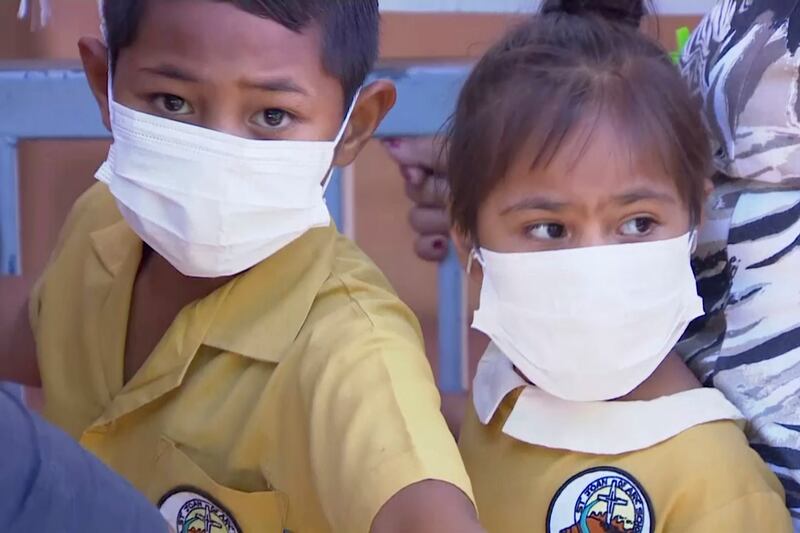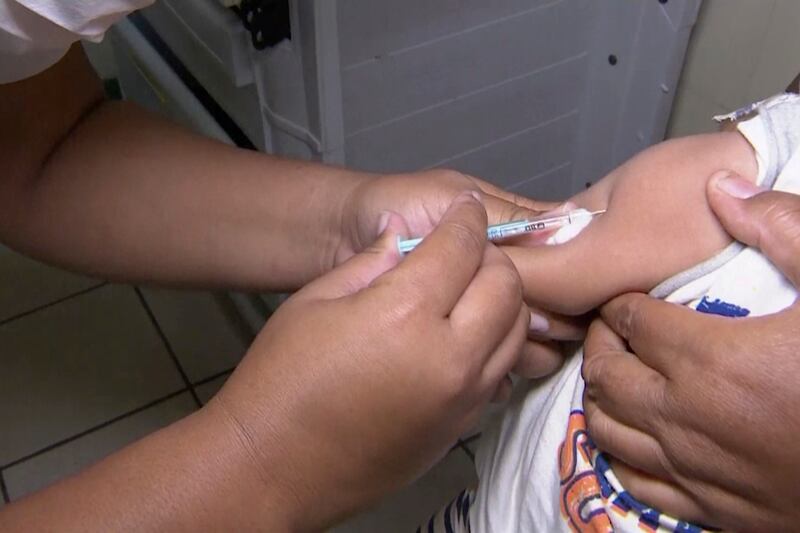In 2019, a devastating measles outbreak erupted in Samoa. Eighty-three people, most of them children, died. Another 5,000 contracted the disease. In total, around 3% of the small island’s population fell ill.
This week, Hawaii Gov. Josh Green is attempting to lay the blame for the outbreak on Robert F. Kennedy Jr., the nominee to lead the U.S.’ health agencies.
Green, a physician, was part of a medical mission that was dispatched to Samoa in 2019 in response to the outbreak. He said misinformation about vaccines was the leading cause of the crisis, and he points to Kennedy as one of the most “prominent voices” parroting it.
Now, Kennedy is in Washington, sitting through confirmation hearings as Trump’s nominee to be Health and Human Services secretary. Green is in Washington, too, lobbying senators to oppose Kennedy as part of a larger Democratic push against Kennedy’s confirmation.
“(The Samoa outbreak) happened because — directly because — the Kennedy people went into Samoa and worked with anti-vaccination organizations to torpedo the belief in public health,” Green told the Deseret News.
During Kennedy’s first confirmation hearing Wednesday, two different senators questioned him about his link to the Samoa measles outbreak.
In 2018, improperly prepared vaccines — after nurses mixed doses with muscle relaxants instead of water — led to the deaths of two Samoan children. The incident sparked widespread mistrust in the vaccine program, including from Samoa’s prime minister, who suspended MMR immunizations altogether.
On Wednesday, Kennedy said his June 2019 visit to Samoa came “when vaccination rates were already below any previous level.”
“I went there, nothing to do with vaccines,” Kennedy said. “You will not find a single Samoan that will say, ‘I did not get a vaccine because of Bobby Kennedy.’”
Kennedy’s direct role in the outbreak is disputed. Vinay Prasad, professor of epidemiology at the University of California, San Francisco, argues that the outbreak was caused by a “constellation of factors,” including the nurses who improperly administered vaccines in 2018 and the government’s poor response later, “which included halting the vaccination program.”
Green, however, has a different point of view. In December 2019, Green, then serving as Hawaii’s lieutenant governor, joined about 75 other Hawaiian physicians on an emergency mission to Samoa. “What we saw was unbelievable,” Green said: villages overrun by measles; one infant girl, “still warm from the incredibly high fever that the measles caused,” Green said, “but she was no longer breathing and her heart wasn’t beating.”
“I put my stethoscope on her, and she was gone,” he recalled.
In total, Green and his fellow Hawaiian doctors administered vaccines to over 37,000 people. But the governor saw it as a tragedy that was altogether preventable, stemming back to the 2018 vaccine accident that killed two infants.
“The vaccine was fine. The reagent was a mistake,” Green said. “And then after that tragedy, people had doubt, and that’s when RFK Jr. swooped in and demonized all public health and vaccinations.”

Kennedy said his 2019 visit to Samoa was arranged by Edwin Tamasese, an anti-vaccine advocate who was later arrested during the outbreak. The purpose of Kennedy’s visit, Kennedy wrote on his blog, was to help the government introduce a medical tracking system to analyze the safety of vaccines and other drugs. Local leaders were interested in the system, Kennedy said, “following the ‘natural experiment’ created by the national respite from vaccines.”
Green said a willingness to entertain such an experiment is “amoral.”
“He says, on the one hand, he would vaccinate himself and maybe his own children, yet he performed a natural experiment on Samoan children,” Green said.
The 2019 outbreak’s effects were felt well beyond the Pacific island. In Utah, which has the third-highest Samoan American population per capita of U.S., many individuals had family members or friends affected by the outbreak, said Rep. Jake Fitisemanu, a member of the Utah Legislature.
“In a country like Samoa, where people are so tight knit, word travels quickly through family networks,” said Fitisemanu, D-West Valley City, who works in public health. “That’s great when there’s good information, credible information, that can be shared through those social networks. But it can be very detrimental when it’s in the opposite direction.”
Less than three months later, in March 2020, the COVID-19 pandemic was declared a national emergency in the U.S. Lingering anti-vaccine sentiment was especially prominent in the Pacific Islander community, whose vaccine rates trailed other demographic groups.
In Hawaii, meanwhile, Green said he used what he learned from the Samoa outbreak to steer his state through the COVID-19 pandemic. Hawaii had the lowest mortality rate of any U.S. state.
“We learned a lot from the Samoa experience,” Green said. But the “real tragedy,” he added, is that Kennedy “learned the exact opposite — he learned that you could run a natural experiment and let a disease spread, and you could use misinformation to do it.”
During his confirmation hearing Wednesday, Kennedy attempted to walk back his previous statements about vaccines. “I support the measles vaccine,” he said. “I support the polio vaccine. I will do nothing as HHS secretary that makes it difficult or discourages people from taking either of them.”
Sen. Ron Wyden, D-Ore., responded, “Anybody who believes that ought to look at the measles book you wrote, saying parents have been misled into believing that the measles is a deadly disease. That’s not true.”



